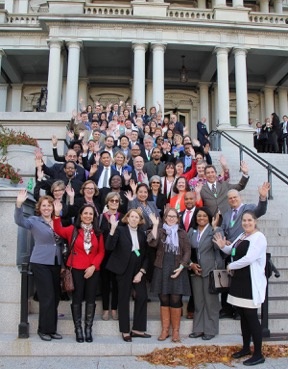Computer Science Educators Lead National Summit in Washington, D.C.

Nearly 100 educators, researchers, non-profit and industry leaders and government officials from 16 states and Puerto Rico recently attended a two-day summit of the Expanding Computing Education Pathways (ECEP) project in Washington, D.C., organized by Rick Adrion, Renee Fall and Sarah Dunton of the College of Information and Computer Sciences (CICS).
Among other topics, participants discussed computer science education reform, metrics and future directions.
Adrion is professor emeritus in CICS and principal investigator for ECEP. Fall is co-principal investigator and project leader of the Commonwealth Alliance for Information Technology Education. Dunton is the campus's ECEP alliance manager. All three led discussions and presentations in panels and workshops at the summit on Oct. 28-29.
Dunton says goals included strengthening a sense of community among ECEP state leaders and exploring state-level models of education practice with research collaborations. Attendees also discussed using meaningful measures of change to inform state strategies in implementing President Obama's 2016 "Computer Science for All" initiative.
The first day of the ECEP summit was held in the Eisenhower Executive Office Building in conjunction with the White House symposium on state implementation of Computer Science for All and was co-sponsored with the White House Domestic Policy Council and the Office of Science and Technology Policy, the National Science Foundation (NSF), and the Research+Practice Collaboratory.
Julie Flapan, executive director of the Alliance for California Computing Education for Students and Schools (ACCESS), said she found the ECEP summit "a great blend of theory, research, practice and policy from different and new perspectives I haven't heard from in our regular CS gatherings." She added, "Learning from each other reinforced the importance of a community of statewide advocates for broadening pathways in computing."
A first-day workshop explored how research-practice partnerships can identify key questions and areas for building and sustaining evidence-based practice, Dunton said. NSF programs and the president's initiative have created what she called "an unprecedented rise in the implementation of computer science education efforts across the United States."
On the second summit day at the Mount Vernon campus of George Washington University, Adrion facilitated a panel on how each state's educational and political systems and policies influence how leaders approach computer science education reform.
ECEP is an NSF-funded alliance to facilitate state-level computing education reforms. The ECEP Alliance includes Alabama, Arkansas, California, Connecticut, Georgia, Indiana, Maryland, Massachusetts, New Hampshire, Nevada, North Carolina, Rhode Island, South Carolina, Texas, Utah and Virginia, and Puerto Rico.
Source: Expanding Computing Education Pathways (ECEP) Alliance